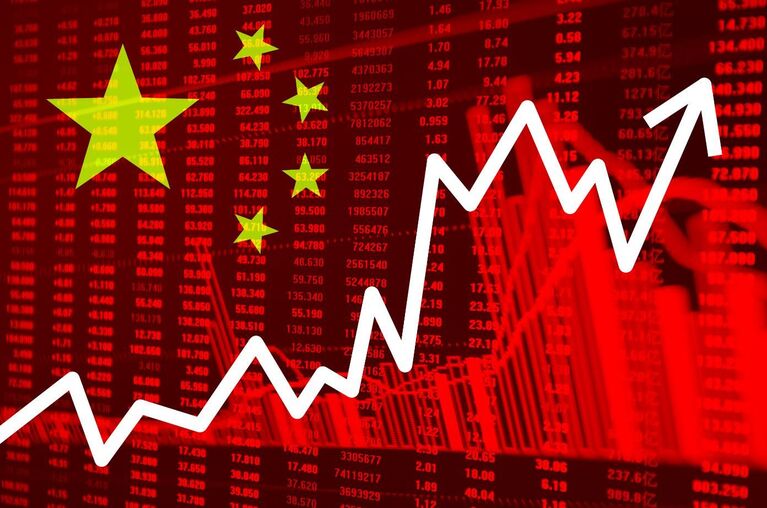
Watch our week ahead video preview, read our pick of the top stories to look out for this week (25-29 May), and view our key company earnings schedule.
UK chief market analyst, Michael Hewson, looks back at the various price moves of the last week, and ahead to the latest revisions to US, Germany and France Q1 GDP. He also looks at the key price levels on FTSE 100, DAX, S&P 500, Hang Seng, EUR/USD, GBP/USD and Gold.
Germany GDP (Q1) & IFO (May)
Monday: In its April reading, German IFO hit a record low of 74.3, as economic output and business confidence collapsed with economic activity shutting down across the whole of Europe. With the German economy sinking into recession in Q1, after a 0.1% contraction in Q4, there is little expectation that things will improve in Q2. Monday’s final Germany Q1 GDP number is expected to be confirmed at -2.2%, however this could be revised lower as the final data for March gets factored in. The only silver lining is that the latest IFO reading for May could see an improvement off the record low in April. This is because economies across Europe have started to ease lockdown restrictions, which means a lot of these indicators are likely to see a pickup in the coming months, in the absence of the re-imposition of lockdown measures.
US Consumer Confidence (May)
Tuesday: Only a few months ago, US consumer confidence was sitting near 20-year highs, so the sharp fall in April back to levels last seen in September 2014 shouldn’t have been too much of a surprise. The real surprise was the fact that we didn’t fall even lower, to the levels in February 2009 as we came out of the financial crisis. This of course doesn’t mean the data won’t deteriorate further, after all the number of Americans signing up for jobless claims since the last confidence reading has soared, to levels way beyond those at the height of the financial crisis. It’s hard to imagine that consumer confidence won’t fall further when set against such a bleak economic reality.
British Land full-year (FY20) results
Wednesday: Real-estate investment companies have taken an absolute battering in recent months, and that was even before the coronavirus shutdowns that have seen retailers and some businesses unable to pay their rents. Unlike some of its peers, British Land owns a higher proportion of office space than it does retail space, with a particular focus on its flagship developments in London. That still didn’t prevent a slide of 34% in revenue in its first-half numbers in November. Underlying profit fell to £152m from £169m, as retail valuations fell 10.7%. With peers like Intu struggling to survive due to non-payment of rents by similarly struggling retailers, the next few months are likely to be difficult for all commercial property owners. British Land may be in a better position than some of its peers, but unless the UK economy is able to rebound in a sustained manner over the rest of the year, then this sector is likely to find itself having to absorb further losses and writedowns on their portfolios in the coming months, particularly if home working becomes the new normal and businesses downsize their office space requirements.
US Beige Book
Wednesday: The last Beige Book in April showed US businesses retrench sharply, with leisure, hospitality, and manufacturing recording some of the biggest declines. Employment fell in all districts as employees were either furloughed or let go. The near-term outlook was for this trend to continue with little in the way of upward pressure on wages or prices. The survey also pointed to disruption in supply chains due to problems in agriculture as a result of social distancing. This week’s Beige Book is unlikely to paint a markedly different picture to the one in April, though we might see some optimism start to creep in as the US economy gets set to reopen in a number of key states and areas.
HP Q2 FY20 results
Wednesday: The death of the PC has been predicted for quite some time now, however the shift to working from home in the wake of the coronavirus pandemic has precipitated a big shift in demand in recent weeks. About a month ago, Lenovo’s head of business said that they had never been this busy. This offers a unique opportunity to the likes of HP, who offer a range of products and peripherals to address this specific demand dynamic. There have been reports that HP has struggled to fulfil some of this pickup in demand and it’s true that some of its products have gone out of stock due to some supply chain disruption, which may act as a drag on its Q2 numbers. In Q1 HP’s US PC shipments declined 13.9%, an underperformance it needs to address quickly. While HP still accounts for 21.8% of the global market, it’s under pressure from some of its more nimble and cheaper peers. For the full-year, the company expects to see earnings per share (EPS) of $2.33-$2.43. Q2 expectations are for EPS to come in at $0.45 a share, which seems a little on the low side.
Ralph Lauren Q4 FY20 results
Wednesday: Luxury brands haven’t been immune to the global pandemic crisis and Ralph Lauren isn’t expected to be any different. During Q3 the fashion retailer’s revenue increased to $1.8bn, led by decent improvements in Asia and European markets, despite the disruption in Hong Kong. Profit also beat expectations, coming in at $2.86 a share. This quarter is expected to be a complete contrast given the global coronavirus shutdowns, and while the business does have an online operation, it probably won’t be enough to prevent a Q4 loss of $0.18 a share. Ralph Lauren will probably miss its previous guidance for fiscal 2020 revenue to jump between 2% and 3%.
Daily Mail & General Trust half-year (H120) results
Thursday: At its pre-close trading update on 26 March, Daily Mail and General Trust (DMGT) said that trading was in line with expectations, however management said the shutdown was likely to have significantly adverse effects on the overall business. In the five months to the end of February, underlying group revenues were up 3%, however CEO Paul Zwillenberg warned that advertising revenue, particularly in print, was likely to be negatively affected. We’ve already seen the consequences, with reports of wholesale job losses across the print and digital media sector in the past few weeks. DMGT went on to say that it has £363m of gross cash, as well as £374m of committed undrawn bank facilities.
US economy Q1 GDP
Thursday: The US economy contracted by 4.8% annually in the initial Q1 GDP release a few weeks ago, a huge fall when you consider that for most of the quarter the economy was humming along nicely. It was only in the last two weeks of March that the economy went into shutdown, with jobless claims jumping as much as 10m in the last two weeks of the quarter. This week’s preliminary Q1 GDP reading will include more missing data from the final weeks of March, which could see the number revised even lower. We know retail sales and personal spending slumped sharply in March, which in such a consumer-driven economy makes the prospect of further weakness even more likely.
US personal spending (April)
Friday: In March, US personal spending slumped sharply to a record low of -7.5%, as headlines started to reach US shores about the rising global death toll of Covid-19, and that was before the US economy had fully locked down. When the US economy did go into lockdown as cases started to rise in New York, there was still just under two weeks of March left. Having remained in lockdown for all of April, it stands to reason that the record low in March is likely to be fairly short-lived, with another shocking number of -10.9% expected.
Williams-Sonoma Q1 FY21 results
Friday: A decent bellwether of the US economy, Williams-Sonoma specialises in a range of household cookware, bakeware and furniture, and is one of the biggest retailers in this space. The company also owns the Pottery Barn and West Elm brands, and in January its shares hit record highs on the back of optimism that it would continue to see consistent gains in operating margins. Since then, however, the US economy has taken a turn for the worse, while the share price dipped sharply, though since then the shares have rebounded quite strongly. In Q4, Williams-Sonoma reported double-digit gains in traffic, revenue and new customers. There is still likely to have been a significant hit to overall revenue given the closure of its stores worldwide, though the business does have a very efficient online operation, which could compensate to some extent. Nonetheless, expectations are for a quarterly loss of $0.07 a share.
Index dividend schedule
Dividend payments from an index's constituent shares can affect your trading account. See this week's index dividend schedule
Selected UK & US company announcements
| Monday 25 May | Results |
| No major announcements scheduled | |
| Tuesday 26 May | Results |
| Autozone (US) | Q3 |
| Kainos (UK) | Full-year |
| Wednesday 27 May | Results |
| Box (US) | Q1 |
| British Land (UK) | Full-year |
| Brtivic (UK) | Half-year |
| HP (US) | Q1 |
| iMedia Brands (US) | Q1 |
| NetApp (US) | Q4 |
| Ralph Lauren (US) | Q4 |
| Thursday 28 May | Results |
| Costco (US) | Q3 |
| Daily Mail & General Trust (UK) | Half-year |
| Dell Technologies (US) | Q1 |
| Dollar General (US) | Q1 |
| Dollar Tree (US) | Q1 |
| Firstgroup (UK) | Full-year |
| Johnson Matthey (UK) | Full-year |
| KNOT Offshore Partners (US) | Q1 |
| PayPoint (UK) | Full-year |
| Salesforce (US) | Q1 |
| SIG (UK) | Full-year |
| Workday (US) | Q1 |
| Friday 29 May | Results |
| Williams-Sonoma (US) | Q1 |
Company announcements are subject to change. All the events listed above were correct at the time of writing.
Disclaimer: CMC Markets is an execution-only service provider. The material (whether or not it states any opinions) is for general information purposes only, and does not take into account your personal circumstances or objectives. Nothing in this material is (or should be considered to be) financial, investment or other advice on which reliance should be placed. No opinion given in the material constitutes a recommendation by CMC Markets or the author that any particular investment, security, transaction or investment strategy is suitable for any specific person. The material has not been prepared in accordance with legal requirements designed to promote the independence of investment research. Although we are not specifically prevented from dealing before providing this material, we do not seek to take advantage of the material prior to its dissemination.






















